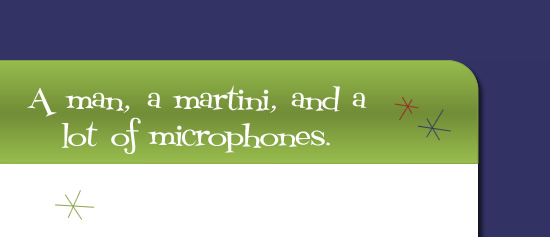Why you need to think about an invoicing strategy for your clients.
I've recently read the posting from John Taylor about his adventures with PayPal. I'm very glad that things worked out for him and that he was able to get his session fees back from the client. However, this raises a good time to point out that you need to have a strategy regarding how you invoice a client.
Being a true fan of the Age of Information, I love the ability to send out invoices to my clients. It makes life a lot easier for both them and myself. However, it's a bit more difficult to prove that you delivered a service via an electronic format. I'm sorry, but there are two major factors working against you if a client should choose to abscond with your voiceover work without paying:
We face risks every day, and for the most part we do pretty well at identifying which ones are real, which are assumed, which are deceptive, and which can be ignored. And taking a page from a previous blog post of mine and revisit the things we can do with a risk:
Since one of the goals in a voiceover business is to make money, we're probably going to want to mitigate the risk. From John Taylor's blog post, he identified that since there wasn't any "physical good" for his voiceover, PayPal could not do anything more than to automatically refund the client's money back to the originating account, leaving John without payment for the services he provided. As part of the normal course of my operations (as you'll find in the FAQ section on my webpage) I use a two-pronged approach to making sure that I invoice my clients properly. Since most clients request an electronic copy of their invoice, I e-mail them a copy (which is what most folks do). I additionally send a copy via USPS in order to guarantee that they've gotten the invoice. My own philosophy and experience is that it's easy for someone to accidentally forget about an e-mail which was sent weeks ago and is now lost in the dustbin of my inbox (or worse, accidentally deleted). Providing an independent secondary source of supplying a client with my invoice reduces the chance of a client accidentally misplacing it. It further serves as a means (via delivery tracking) to provide a paper trail should something go awry with payment.
Don't get me wrong, I trust my clients. Without a measure of trust, you need to get out of this business. But I'm a firm believer in "trust but verify". The flip side of the coin is that it also provides my clients with an additional degree of protection since they can match the two invoices to make sure that the cost of my services have been properly stated, and just as importantly, they now have a physical copy (via CD) of the tracks I've recorded for them.
Greg's personal note: Being a little sneaky, I'll also admit that this gives me the chance to do some extra marketing by making sure that the mailed invoices use a mailing label with the website and logo affixed to them (trust me, you don't want to send invoices using a handwritten envelope; take the time to make something more professional for your clients... they do notice).
I'm not saying that my way is the only way, just that it seems to be covering the bases and providing a risk mitigation plan that permits me a stronger level of assurance than just using electronic methods alone. If you've got a method or strategy that works for you, let me know in the comments. Who knows? We all might learn something from each other (which is why this blog was put here in the first place ;)
Cheers!
-Greg
Being a true fan of the Age of Information, I love the ability to send out invoices to my clients. It makes life a lot easier for both them and myself. However, it's a bit more difficult to prove that you delivered a service via an electronic format. I'm sorry, but there are two major factors working against you if a client should choose to abscond with your voiceover work without paying:
- The law has yet to catch up with technology, and it probably never will.
- Since most voiceover work is defined as a "service" it's very difficult to prove that the service was provided if we use electronic formats for everything. Since a civil court will usually side with the defendant by default, the fact that your voiceover work was "neither earned nor realized" (one of the key conditions for payment, from a financial viewpoint) is not taken into consideration.
We face risks every day, and for the most part we do pretty well at identifying which ones are real, which are assumed, which are deceptive, and which can be ignored. And taking a page from a previous blog post of mine and revisit the things we can do with a risk:
- Accept the risk - basically we acknowledge what the risk is and the consequences for not doing anything to protect ourselves.
- Remove the risk - stop performing the action that puts us at risk (obviously this isn't an option if you're trying to run your voiceover business).
- Transfer the risk - have someone else assume it for us (Voices.com's surepay system would be a good example of this)
- Mitigate the risk - take proactive measures to limit our exposure to the risk.
Since one of the goals in a voiceover business is to make money, we're probably going to want to mitigate the risk. From John Taylor's blog post, he identified that since there wasn't any "physical good" for his voiceover, PayPal could not do anything more than to automatically refund the client's money back to the originating account, leaving John without payment for the services he provided. As part of the normal course of my operations (as you'll find in the FAQ section on my webpage) I use a two-pronged approach to making sure that I invoice my clients properly. Since most clients request an electronic copy of their invoice, I e-mail them a copy (which is what most folks do). I additionally send a copy via USPS in order to guarantee that they've gotten the invoice. My own philosophy and experience is that it's easy for someone to accidentally forget about an e-mail which was sent weeks ago and is now lost in the dustbin of my inbox (or worse, accidentally deleted). Providing an independent secondary source of supplying a client with my invoice reduces the chance of a client accidentally misplacing it. It further serves as a means (via delivery tracking) to provide a paper trail should something go awry with payment.
Don't get me wrong, I trust my clients. Without a measure of trust, you need to get out of this business. But I'm a firm believer in "trust but verify". The flip side of the coin is that it also provides my clients with an additional degree of protection since they can match the two invoices to make sure that the cost of my services have been properly stated, and just as importantly, they now have a physical copy (via CD) of the tracks I've recorded for them.
Greg's personal note: Being a little sneaky, I'll also admit that this gives me the chance to do some extra marketing by making sure that the mailed invoices use a mailing label with the website and logo affixed to them (trust me, you don't want to send invoices using a handwritten envelope; take the time to make something more professional for your clients... they do notice).
I'm not saying that my way is the only way, just that it seems to be covering the bases and providing a risk mitigation plan that permits me a stronger level of assurance than just using electronic methods alone. If you've got a method or strategy that works for you, let me know in the comments. Who knows? We all might learn something from each other (which is why this blog was put here in the first place ;)
Cheers!
-Greg










0 Comments:
Post a Comment
Subscribe to Post Comments [Atom]
<< Home